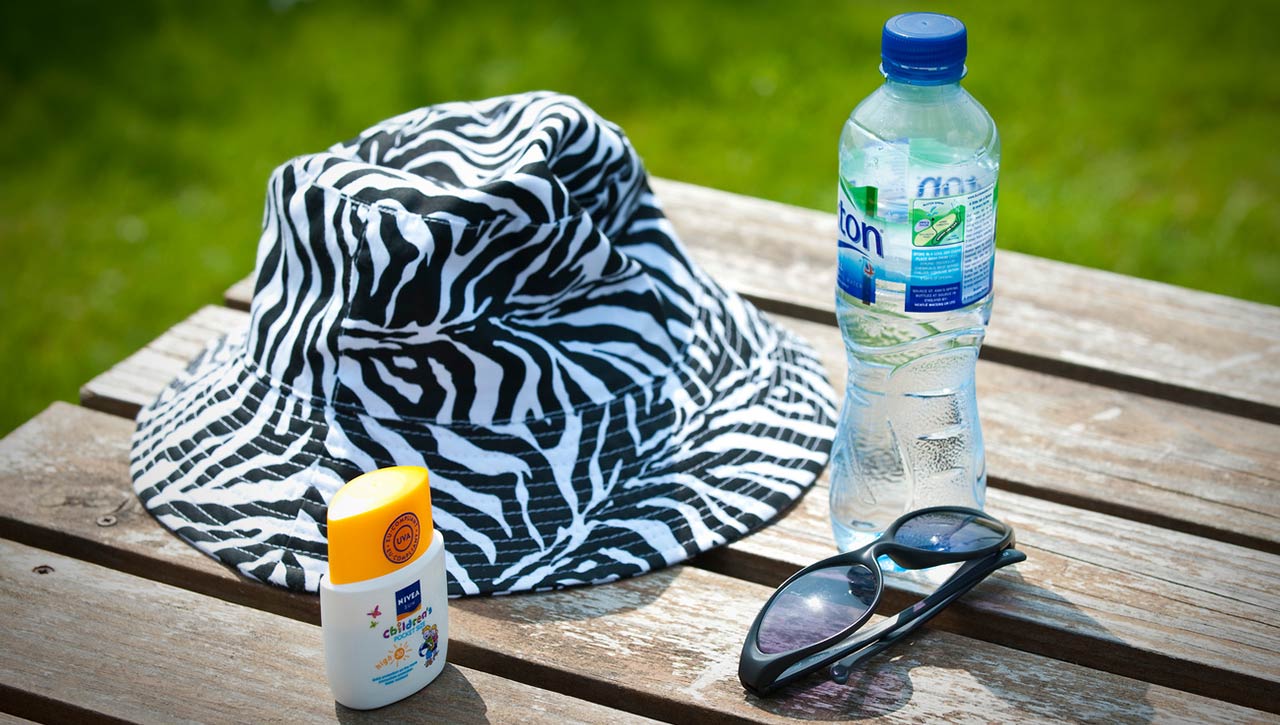
Sun Health
Follow these handy tips to make sure you stay safe in the sun this summer:-
Sunscreen
- Use sunscreen with a sun protection factor (SPF) of at least 15 for mild protection, 30 for moderate protection and 50 for high protection. visit NHS Inform for more information on preventing sunburn.
- To make sure you never burn – keep a handy-sized bottle of sunscreen with you so that you’ll always have some to hand.
- Don’t get caught out at home – the sun can be strong in the UK as well as abroad, so it’s not just when you’re on holiday that you need to think about protecting your skin in the sun.
Children and Babies
- Protect your children from the sun – young skin is delicate and very easily damaged by the sun. Use at least a factor 30 sunscreen and choose a broad-spectrum brand that has a four- or five- star rating.
- Babies younger than 6 months should be keep out of the sun.
- Don’t cover prams and buggies with blankets, cloths or any cover – this prevents air circulating, and can cause overheating. Attach a clip-on sunshade or parasol to prams or buggies instead.
- Check how hot babies are by feeling their chest or the back of their neck.
Drink water to stay hydrated
- Drink plenty – at least six to eight glasses glasses a day. Choose water and fruit juices rather than drinks with caffeine in them. Remember, alcoholic drinks can make dehydration worse.
- Dehydration in older people can contribute to a number of health issues including tiredness, headaches, feeling lightheaded and confusion. Drinking between six and eight glasses of tap water a day helps keep dehydration at bay as well as supporting mental and physical health and wellbeing.
- Visit Age Scotland for more information on how those of us who are older can stay safe in hot weather.
Spend time in the shade
- If your shadow is shorter than you are, then the sun is strong. The sun is at its strongest between 11am and 3pm. It is best to spend time in the shade during these times.
Clothing
- Wear a hat, t-shirt and sunglasses when the sun’s strong. A wide-brimmed hat, light long-sleeved top and trousers or maxi dress will help to protect your skin.
- When choosing sunglasses, make sure they have the CE Mark and British Standard, have a UV 400 label and offer 100% UV protection.
Know your skin
- If you have lots of moles or freckles, you have a higher risk of developing skin cancer, so you need to take extra care.
- Keep an eye out for changes to your skin and tell your doctor of any changes.
Stay safe in the sun. Watch our parody of the Robert Burns poem ‘My Love is Like a Red Red Rose’. The animated video sees ‘Rabbie Burns’ suffering from sun burn on a trip to the beach while his counterpart, ‘Rabbie Disnae Burn’, has a fun day out as he has protected himself from the sun.
This handy guide to skin cancer will arm you with the facts you need to spot signs of skin cancer:
- The skin does several jobs. It protects the inside of the body from damage, helps to regulate our temperate and gets rid of some body waste through sweat.
- Skin cancer is one of the most common cancers in the world.
- There are more than 11,000 new cases of non-melanoma skin cancer every year in Scotland. 10 per cent of these are the most serious form of skin cancer.
- Skin cancer is mainly caused by overexposure to ultraviolet (UV) light. UV light comes from the sun, as well as artificial sunbeds and sunlamps.
- In addition to UV light overexposure, there are certain things that can increase your chances of developing skin cancer, such as a family history of the condition, pale skin that burns easily and a large number of moles or freckles.
- You can reduce your chances of developing skin cancer by avoiding overexposure to UV light.
- Signs of skin cancer can include moles that change in size, appearance or colour.
- Look out for spots or sores that itch, hurt, are scabbed or crusty, or bleed for more than four weeks.
- Surgery is the main treatment for cancer. This involves removing the cancerous tumour and some of the surrounding skin.
- Regularly checking your skin for signs of skin cancer can help lead to an early diagnosis and increase your chances of successful treatment.

